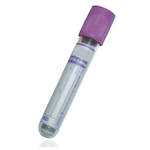Suitable Specimen Types
- Serum
- EDTA Plasma
Specimen Transport
First Class PostSample Processing in Laboratory
UsualSample Preparation
Centrifuge sample and separate serum or plasmaTurnaround Time
5 DaysSample Stability
4 ºCMycophenolic Acid
General Information
Mycophenolic acid (MPA)-based therapies are widely used in combination with calcineurin inhibitors as maintenance immunosuppression for kidney transplant recipients. The two MPA therapies used in clinical transplantation are mycophenolate mofetil (MMF [brand name CellCept, Roche Pharmaceuticals, Nutley, NJ]) and mycophenolate sodium (MPS [brand name Myfortic, Norvartis Pharmaceuticals, Nutley, NJ]). MMF has been used for more than a decade and is a prodrug of MPA.
Immunosuppression afforded by MPA is achieved via reversible and uncompetitive inhibition of inosine monophosphate dehydrogenase (IMPDH), resulting in inhibition of guanine nucleotide biosynthesis. This consequently leads to suppression of both new DNA synthesis and other pathways that depend on a continuous supply of guanine nucleotide pool, such as T cell surface antigens and other glycosylated membrane proteins.
Taken from Shaw et al. Clin J Am Soc Nephrol 2: 1062-1072, 2007
Common adverse drug reactions (≥1% of patients) associated with mycophenolate therapy include diarrhea, nausea, vomiting, infections, leukopenia, and/or anemia. Mycophenolate sodium is also commonly associated with fatigue, headache, and/or cough. Intravenous (IV) administration of mycophenolate mofetil is also commonly associated with thrombophlebitis and thrombosis. Infrequent adverse effects (0.1–1% of patients) include esophagitis, gastritis, gastrointestinal tract hemorrhage, and/or invasive cytomegalovirus (CMV) infection.
Patient Preparation
Trough sample preferred.
Knowledge of other immunosuppressive drugs required.
Notes
None
Reference Range
Provided by Reference Laboratory
Specifications
- EQA Scheme?: Yes
